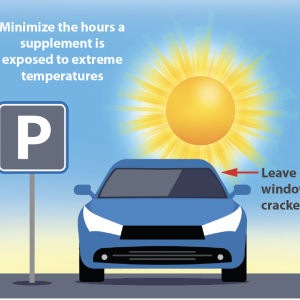
Storing Supplements in Hot Weather
How a supplement is affected by temperature depends on the formulation of the supplement. Typically powders and pellets tend to be more …
» View Article
How a supplement is affected by temperature depends on the formulation of the supplement. Typically powders and pellets tend to be more …
» View Article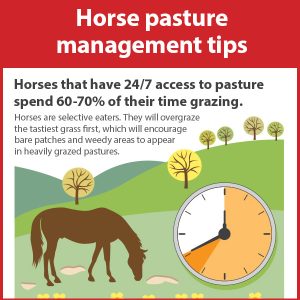
Healthy pastures require year-round maintenance. Fall is an important time to evaluate your horse pastures. Depending on your situation, you...
» View Article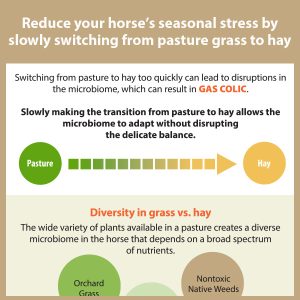
See link below to download a print version of this infographic. Click here to download a print version of this...
» View Article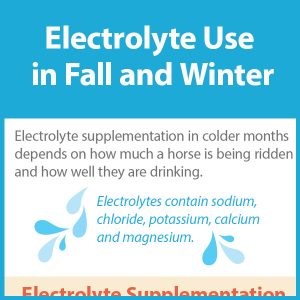
Electrolyte supplementation in colder months depends on how much a horse is being ridden and how well they are drinking. Horses that are ridden lightly a few times a week and drink well probably get sufficient electrolytes from hay, concentrate and salt block. Horses that train hard and sweat daily may require a well-formulated electrolyte supplement even in colder months.
» View Article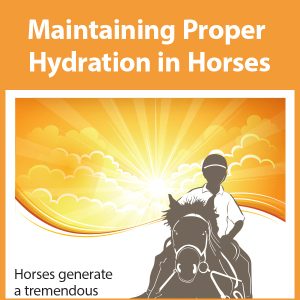
Horses generate a tremendous amount of heat in their bodies when they exercise or when they are stressed.
» View Article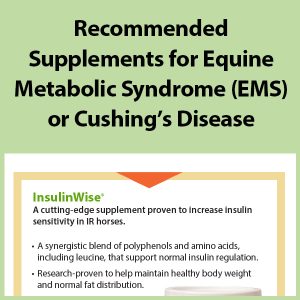
InsulinWise® A cutting-edge supplement research-proven to support healthy insulin regulation. A synergistic blend of polyphenols and amino acids, including leucine, that supports normal insulin regulation. Research-proven to help maintain healthy body weight and normal fat distribution. Sustains healthy hoof laminae. Ask your vet if InsulinWise is right for your horse.
» View Article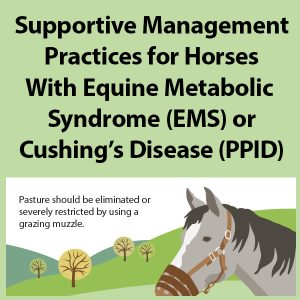
Pasture should be eliminated or severely restricted by using a grazing muzzle. Pasture is particularly dangerous in the spring and the fall in areas where cool-season grasses flourish. WARM DAYS (60° or above) + COOL NIGHTS (40° or below) = More sugars stored in leaves NSC = nonstructural carbohydrates, aka simple sugar and starch
» View Article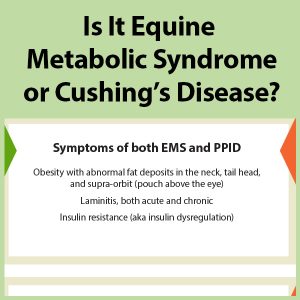
Symptoms of both EMS and PPID Obesity with abnormal fat deposits in the neck, tail head, and supra-orbit (pouch above the eye) Laminitis, both acute and chronic Insulin resistance (aka insulin dysregulation)
» View Article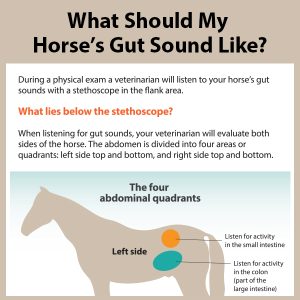
During a physical exam a veterinarian will listen to your horse’s gut sounds with a stethoscope in the flank area. What lies below the stethoscope? When listening for gut sounds, your veterinarian will evaluate both sides of the horse. The abdomen is divided into four areas or quadrants: left side top and bottom, and right side top and bottom.
» View Article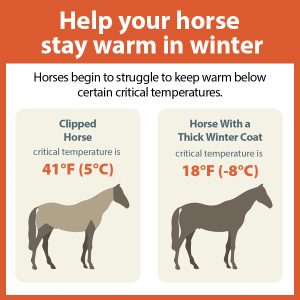
Horses begin to struggle to keep warm below certain critical temperatures. Clipped Horse - Critical temperature is 41°F (5°C) Horse With a Thick Winter Coat - Critical temperature is 18°F (-8°C) The easiest and most effective way to keep your horse warm when the temperatures drop is to feed additional forage.
» View Article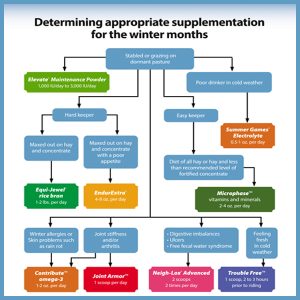
Worried about your horse staying healthy this winter? Targeted supplements can help! Check out our winter decision tree and find...
» View Article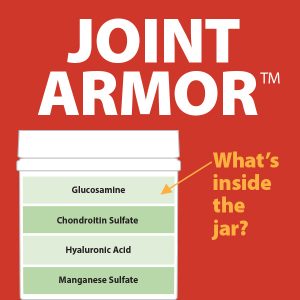
Click here to download a print version of this infographic. Text-only version of “Joint Armor™: What’s Inside the Jar” Joint...
» View Article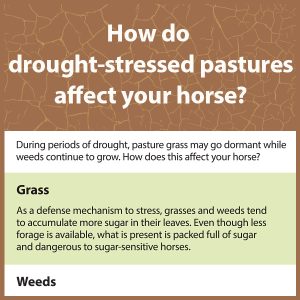
During periods of drought, pasture grass may go dormant while weeds continue to grow. How does this affect your horse?
» View Article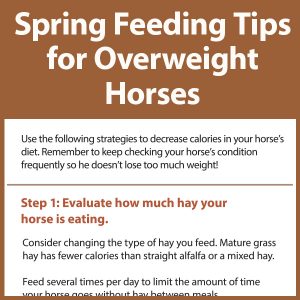
Use the following strategies to decrease calories in your horse’s diet. Remember to keep checking your horse’s condition frequently so he doesn’t lose too much weight!
» View Article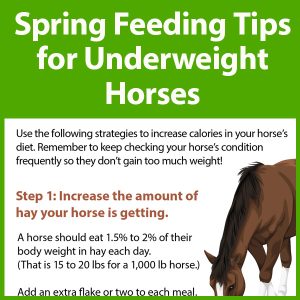
Use the following strategies to increase calories in your horse’s diet. Remember to keep checking your horse’s condition frequently so they don’t gain too much weight!
» View Article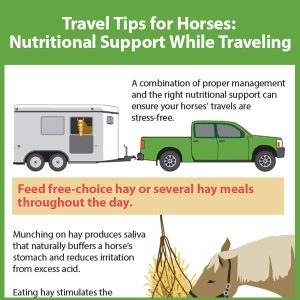
Travel Tips for Horses- Part 2: Nutritional Support While Traveling
» View Article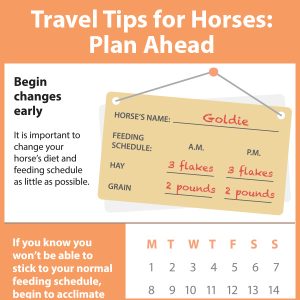
Travel Tips for Horses- Part 1: Plan Ahead
» View Article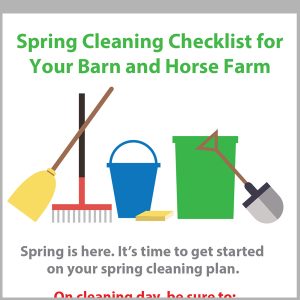
Spring is here. It’s time to get started on your spring cleaning plan. On cleaning day, be sure to: Turn out horses so they are not exposed to dust stirred up by cleaning. Open all windows and doors for ventilation.
» View Article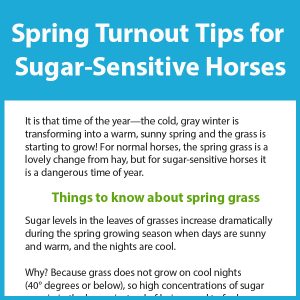
For normal horses, the spring grass is a lovely change from hay, but for sugar-sensitive horses it is a dangerous time of year.
» View Article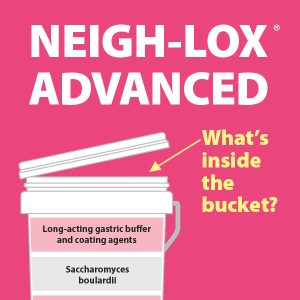
Neigh-Lox Advanced contains a proprietary blend of research-proven ingredients that work synergistically to maintain healthy equine GI tract tissues.
» View Article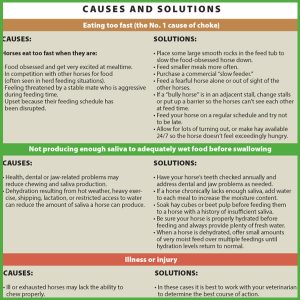
Click to download chart. Horses choke when a mass of partially chewed feed becomes lodged in their esophagus. In an effort...
» View Article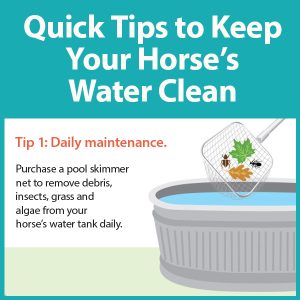
Click here to download a print version of this infographic. Text-only version of “Quick tips to keep your horse’s water...
» View Article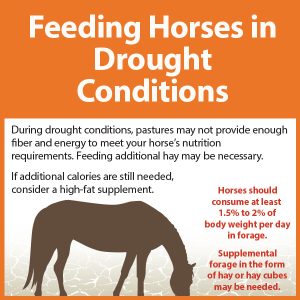
During drought conditions, pastures may not provide enough fiber and energy to meet your horse’s nutrition requirements. Feeding additional hay may be necessary. If additional calories are still needed, consider a high-fat supplement. Horses should consume at least 1.5% to 2% of body weight per day in forage. Supplemental forage in the form of hay or hay cubes may be needed.
» View Article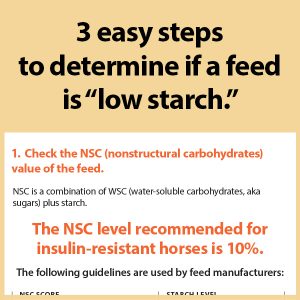
3 easy steps to determine if a horse feed is “low starch". 1. Check the NSC (nonstructural carbohydrates)value of the feed. 2. Look for fat and fiber ingredients at the top of the ingredient list. 3. Make sure any cereal grains and molasses are only present in small amounts.
» View Article
"*" indicates required fields